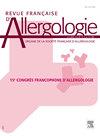Évolution fatale liée à l’abus de dermocorticoïdes chez un adulte
IF 0.3
4区 医学
引用次数: 0
Abstract
Introduction
Topical corticosteroids are widely used in the management of chronic inflammatory dermatoses with impaired skin barrier, such as atopic dermatitis and psoriasis. However, their long-term use can lead to systemic effects due to percutaneous absorption. We report a case illustrating the severity of complications associated with excessive use of these medications.
Observation
A 32-year-old woman had been under follow-up for a dermatologic condition with a relapsing-remitting course, evolving since the age of 3. She was initially treated with a high-potency topical corticosteroid, which led to good improvement. However, she continued self-administering topical corticosteroids for 22 years. She presented with erythroderma characterized by desquamation, edema, and erosions in some areas. The clinical presentation, along with excessive use of betamethasone, suggested iatrogenic Cushing's syndrome. Laboratory tests revealed corticotropic adrenal insufficiency. A skin biopsy confirmed the diagnosis of atopic dermatitis. Management included treatment of fungal, infectious, and metabolic complications. Hydrocortisone was initiated, and after education, topical corticosteroids were replaced with topical tacrolimus. The patient was lost to follow-up and succumbed to adrenal insufficiency one month later.
Conclusion
This case highlights the severity of iatrogenic complications secondary to misuse of topical corticosteroids and underscores the need for proper therapeutic education and adequate follow-up.
成人皮肤皮质激素滥用的致命进化
外用皮质类固醇广泛用于治疗皮肤屏障受损的慢性炎症性皮肤病,如特应性皮炎和牛皮癣。然而,由于经皮吸收,长期使用可导致全身效应。我们报告一个病例说明并发症的严重程度与过度使用这些药物。观察:一名32岁女性,自3岁起因皮肤疾病复发缓解而接受随访。她最初接受了一种高效的局部皮质类固醇治疗,这导致了良好的改善。然而,她继续自我使用局部皮质类固醇22年。她表现为红皮病,特征为脱屑、水肿和部分部位糜烂。临床表现,加上过量使用倍他米松,提示医源性库欣综合征。实验室检查显示促肾上腺皮质功能不全。皮肤活检证实了特应性皮炎的诊断。治疗包括真菌、感染和代谢并发症的治疗。开始使用氢化可的松,教育后,局部皮质类固醇被局部他克莫司取代。患者失访,1个月后死于肾上腺功能不全。结论本病例突出了外用糖皮质激素引起的医源性并发症的严重性,强调了适当的治疗教育和充分的随访的必要性。
本文章由计算机程序翻译,如有差异,请以英文原文为准。
求助全文
约1分钟内获得全文
求助全文
来源期刊

Revue Francaise d Allergologie
Medicine-Immunology and Allergy
自引率
33.30%
发文量
349
期刊介绍:
La Revue Française d''Allergologie : un véritable forum pour faire connaître des travaux originaux et permettre la diffusion de l''information auprès de toutes les spécialités concernées par les pathologies allergiques. La Revue Française d''Allergologie (8 numéros par an) est au carrefour de nombreuses spécialités - dermatologie, pédiatrie, ORL, pneumologie, ophtalmologie, médecine interne - qui, toutes, ont à traiter des maladies allergiques. Les symptômes des allergies fondés sur des mécanismes communs sont le plus souvent associés et se succèdent chez un même patient. En forte progression depuis 20 ans, les maladies allergiques sont dans l''attente de perfectionnements et d''avancées thérapeutiques qui permettront aux nombreux patients qui en sont atteints de mieux vivre avec leurs allergies. La Revue Française d''Allergologie se veut donc un véritable forum de discussions et d''échanges entre tous les spécialistes confrontés aux pathologies
 求助内容:
求助内容: 应助结果提醒方式:
应助结果提醒方式:


